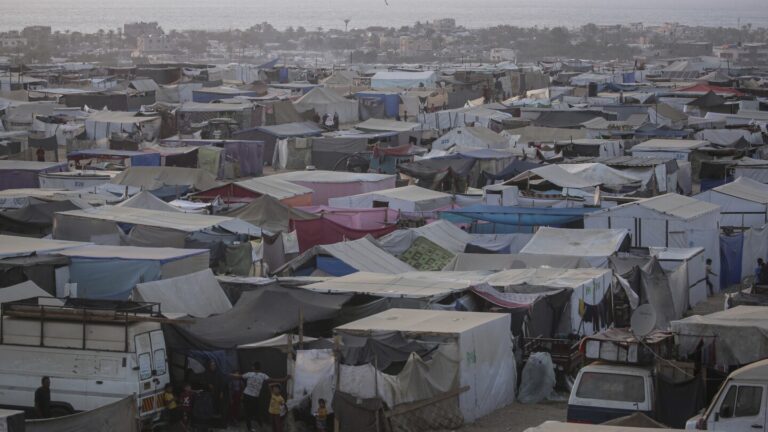JERUSALEM (AP) — An Israeli army spokesman appeared to question the purpose of the army’s declared destruction Wednesday. Hamas militant group in Gaza A public rift between the country’s political and military leadership is rare.
Prime Minister Benjamin Netanyahu has insisted that Israel will continue fighting Hamas, which runs the besieged Gaza Strip, until it has eliminated its military and governance power in the Palestinian territories. The war is in its ninth month.With no clear end or post-war plan in sight, frustration is growing.
“This act of destroying and eliminating Hamas is simply throwing sand in the eyes of the people,” military spokesman Maj. Gen. Daniel Hagari told Israel’s Channel 13 television. “Hamas is an idea, Hamas is a party. Hamas is rooted in the hearts of the people. Anyone who thinks they can eliminate Hamas is wrong.”
In response, Prime Minister Netanyahu’s office said the country’s security cabinet, which he chairs, has “defined as one of the objectives of the war the destruction of Hamas’ military and governing power. Of course, the Israeli army is doing everything in its power to achieve this.”
The military quickly issued an explanation, saying it was “devoted to achieving the war objectives set by the Cabinet” and that “we have been working on this day and night throughout the war and will continue to do so in the future.”
Hagari’s remarks “referred to the destruction of Hamas as an ideology and ideals, which was stated very clearly and explicitly by him,” the army statement added. “Any other claims are taken out of context.”
Signs of dissatisfaction with Netanyahu’s government’s handling of the war are already apparent. Right-wing hardliners opposed to any settlement Months of internationally mediated ceasefire talks with Hamas, including one proposed this month by President Joe Biden, have stalled.
Benny Gantz, a former army commander and centrist politician, Exit from Netanyahu’s war cabinet Earlier this month, he expressed his dissatisfaction with the Prime Minister’s conduct of the war.
Earlier this week, Netanyahu also expressed displeasure with the military’s decision to declare a “tactical ceasefire” in the southern Gaza city of Rafah to help deliver humanitarian aid to the besieged area. Aides said Netanyahu was caught off guard by the announcement, and Israeli television quoted him as saying, “It’s not that we have a country and we have the army, it’s that the army has the country.”
Israel attacked Gaza in response to Hamas attacks. October 7: Cross-border attack in southern IsraelApproximately 1,200 people were killed and 250 were taken hostage in the incident.
Israel’s war effort initially enjoyed broad public support but has become deeply divided in recent months, with Netanyahu vowing “total victory” but a growing number of critics and protesters backing a ceasefire that would result in an Israeli victory. About 120 hostages still in GazaThe Israeli military has said more than 40 hostages have already been killed, and officials fear the death toll will rise the longer the hostages are held.
More than 37,100 Palestinians have been killed in fighting in the Gaza Strip, according to the Gaza Strip Health Ministry, which does not distinguish between combatants and civilians. The war has almost completely cut off supplies of medicines, food and other supplies to the Palestinians, who are Facing widespread hunger.
The United Nations said on Wednesday that a lack of law and order had again prevented humanitarian workers from receiving aid from Israel at the Kerem Shalom border crossing.
Deputy UN spokesman Farhan Haq said there had been no clashes along the route the Israeli forces took to withdraw. A ceasefire was announced every dayLawlessness in the area has prevented UN staff from receiving aid, meaning trucks have not been able to use the new route since Israel announced a daily road halt on Sunday.
In recent weeks, Israeli forces have focused their attacks on nearby cities. Rafah on the border with Egypt It also says that the last remnants of Hamas are resisting.
More than half of Gaza’s 2.3 million people fled to Rafah to escape fighting elsewhere in the strip, and the city is now virtually deserted as Israel carries out air strikes and ground operations.
Israeli forces say they have killed more than 500 fighters and inflicted heavy losses on Hamas forces, but officials expect the operation to continue for at least a few more weeks.
Israel also occupied a 14-kilometer (8-mile) corridor along the Gaza Strip’s border with Egypt, including the Rafah border crossing. Footage circulating on social media showed the crossing charred and destroyed, with only the former passenger terminal remaining intact. Before Israel’s invasion of the area, the crossing was used to deliver humanitarian aid and for Palestinians to leave the territory.
Rafah city’s mayor, Ahmed Al-Sufi, said on Wednesday that Israeli attacks had destroyed more than 70 percent of facilities and infrastructure. He accused the Israelis of systematically targeting the Rafah camps, adding that entire residential areas in one district had been destroyed. Al-Sufi did not immediately respond to a request for additional information.
In a separate incident, an Israeli airstrike in Rafah killed 11 people, said Dr Saleh al-Hamas of the nearby European Hospital. No further details were available and the Israeli military did not immediately comment.
___
Bekatoros reported from Athens, Greece. Associated Press writers Wafaa Shurafa in Deir al-Balah, Gaza Strip, Natalie Meltzer in Nahariya, Israel, and Edith M. Lederer at the United Nations contributed to this report.

